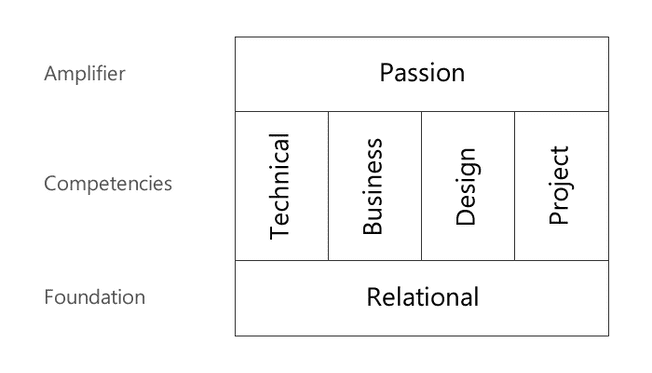The Birthday Cake: A Hiring Framework
November 15, 2020When I started to interview candidates in Bing, John Licata, one of my favorite managers, taught me a framework he called the Birthday Cake. It’s a model that estimates the potential and fit of a candidate into a team. Over the last decade in using it, it has helped provide clarity on tough hiring decisions and has been well-received by many of my colleagues.
The core of the framework is that the various competences you are measuring are supported by strong interpersonal skills and multiplied by passion. Visually, it’s comprised of three horizontal layers: relational foundation, role competencies, and a passion amplifier.

The relational foundation
Without a strong base, the rest of the cake doesn’t matter. It doesn’t matter how skilled or smart you are if you can’t work well with others. And the taller the cake, the stronger the foundation needs to be. Senior roles demand broader impact and therefore higher levels of influence.
When looking at this skill, people often use a behavioral question about how the candidate worked through an interpersonal conflict. Instead, my favorite question is: “How have others helped you deliver impact?“.
I love it for its efficiency as it both requires the candidate to have been someone likable enough for others to help and humble enough to recognize his or her impact is built on the work of others. Too often, questions explore heroics and ego rather than empathy and appreciation.
Competencies
This layer will be often be role and team specific. For generic product management, I typically look at 4 dimensions:
- Technical - Ability to engage with engineers, solve technical problems, and provide technical thought leadership.
- Business - Ability to engage with marketing and business development, define business metrics, and lead the business model.
- Design (User Experience) - Ability to empathize with customers and creating experiences that satisfy their core pain and need.
- Project - Ability to drive complex projects across different teams and organizations.
I’m not expecting everyone to be an expert in each category. In fact, it’s often more powerful to go deep into one category. The power of this model is when you look at the individual birthday cakes across the team to determine whether the team is balanced.
For example, a team that may lack technical leadership may build up engineering debt that crushes them over time. Bringing in a technical leader can help them avoid costly decisions.
And circling back, this is how it’s team specific. The bigger question asked on this layer is whether the skills of the candidate are aligned with what’s asked from the role, and whether the role complement the needs of the team.
The Passion Multiplier
This is the top layer. It elevates everything below it. The candidate may not have all the experiences just yet but has the drive and energy to learn rapidly. The candidate may not have refined his or her interpersonal style but raises the team’s energy with her or her passion.
And in my experience, those with that drive will outperform their peers even if they are less experienced. One of my friends joined Microsoft without an engineering degree or knowing how to code. At the end of his second year in stack ranking, he was the top performer on the team.
With how important passion is, how do we measure it in an interview? For me, passion is measured by both the willingness to learn and the drive to go beyond what’s required.
First, I’ll ask questions about a project they are proud of. Proud is the key word here. I’m looking for an internal bar of quality, a sense of craftsmanship, that they are satisfying.
Second, I’ll explore about what they’ve learned. I’m looking for fascination and an unquenchable curiosity. Also, a willingness to learn requires a sense of humility and openness that there is more to learn.
Using the model at different career stages
While I find the framework applicable across all career stages, the point of the model is to help you think about what’s important for the role and tailor your questions to evaluate fit. Too often hiring models are rigid against some HR-driven competency list.
For example, I’ll see people interview college hires or junior engineers for senior technical competencies as opposed to their interpersonal skills and passion. The most important thing for junior hires is the ability to work with others and their desire to learn. If you need someone productive on day one, you likely need a more senior hire with a strong foundation.
And furthermore, you often don’t get ask a lot of questions at the start of the hiring funnel, so picking the right questions for the role is critical.